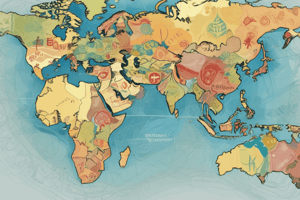Podcast
Questions and Answers
What is one benefit of international trade mentioned in the text?
What is one benefit of international trade mentioned in the text?
- Decreased efficiency in production
- Access to resources and markets (correct)
- Limited expertise exchange
- Increased transportation costs
Which ancient trading network connected Europe and Asia?
Which ancient trading network connected Europe and Asia?
- North American Free Trade Agreement
- Trans-Pacific Partnership
- MERCOSUR
- The Silk Road (correct)
What was a significant technological advancement that reduced transportation costs for international trade?
What was a significant technological advancement that reduced transportation costs for international trade?
- Introduction of air travel
- Discovery of the steamship (correct)
- Invention of the internet
- Development of horse carriages
How does international trade contribute to efficiency according to the text?
How does international trade contribute to efficiency according to the text?
What is a key challenge mentioned in the text related to international trade?
What is a key challenge mentioned in the text related to international trade?
What is one mechanism through which international trade can occur?
What is one mechanism through which international trade can occur?
Which principle of international trade involves a country specializing in producing goods it is comparatively more efficient in producing?
Which principle of international trade involves a country specializing in producing goods it is comparatively more efficient in producing?
What is a challenge associated with international trade that relates to the protection of domestic industries and jobs?
What is a challenge associated with international trade that relates to the protection of domestic industries and jobs?
How do nations benefit from increased exports as mentioned in the text?
How do nations benefit from increased exports as mentioned in the text?
What does trade liberalization aim to achieve in the context of international trade?
What does trade liberalization aim to achieve in the context of international trade?
Study Notes
Economics and International Trade
International trade has become a cornerstone of global economic development, connecting nations and fostering growth, as well as challenging us to navigate complexities and adapt to a constantly evolving landscape. In this exploration of economics, we'll delve into the heart of international trade, covering its history, mechanisms, and the principles that govern this dynamic field.
A Brief History of International Trade
Harking back to ancient civilizations, international trade has a rich history, with goods and ideas being exchanged across continents through maritime and overland routes. The Silk Road, a trading network connecting Europe and Asia, is one such example that dates back to the 2nd century BCE. As time passed, technological advancements such as the invention of the steamship, railroad, and containerization reduced transportation costs and opened up new avenues for trade.
The Benefits of International Trade
International trade offers numerous benefits. Through this exchange of goods and services, nations can gain access to resources, markets, and expertise they might not have otherwise. Some key advantages include:
-
Efficiency: International trade allows nations to specialize in producing goods and services they are best suited to, which results in greater efficiency and lower costs for consumers.
-
Economic growth: By increasing exports, nations can generate more revenue, which can be reinvested to promote economic development.
-
Increased consumption: International trade allows consumers access to a wider variety of goods, leading to increased satisfaction.
The Mechanisms of International Trade
International trade can occur through various mechanisms, such as:
-
Exports and imports: Nations buy and sell goods and services to and from other countries.
-
Offshoring: Companies relocate their production facilities to lower-cost countries, taking advantage of lower wages and lower production costs.
-
Foreign direct investment (FDI): Companies invest in other countries to gain access to new markets, resources, and expertise.
The Principles of International Trade
To better understand international trade, we must also explore the fundamental principles underpinning it:
-
Comparative advantage: A nation can benefit from international trade by specializing in producing goods and services it is comparatively more efficient in producing, and trading these goods for those it is less efficient in producing.
-
Trade liberalization: Reducing trade barriers such as tariffs and quotas increases trade flows and promotes economic growth.
-
Terms of trade: Refers to the ratio between the prices a country receives for its exports and the prices it pays for its imports.
Challenges of International Trade
International trade is not without its challenges. Some of these include:
-
Protectionism: The tendency to impose trade barriers to protect domestic industries and jobs.
-
Income inequality: International trade can exacerbate income disparities between nations and regions.
-
Environmental degradation: The global trade of goods and services can lead to increased environmental degradation, such as deforestation and water pollution.
Conclusion
International trade is an intricate and dynamic field that has shaped the global economic landscape. As the world continues to evolve, understanding the principles, mechanisms, and challenges of international trade will become increasingly important for navigating this ever-changing landscape. By harnessing the power of international trade, nations can promote economic growth, improve living standards, and build stronger, more interconnected communities.
Studying That Suits You
Use AI to generate personalized quizzes and flashcards to suit your learning preferences.
Description
Delve into the intricate world of international trade with a focus on its history, benefits, mechanisms, and underlying principles. Explore the evolution of global trade, the advantages it offers, and the challenges it poses in today's interconnected world.




